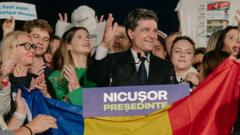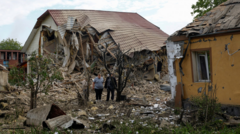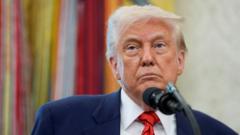The recent elections showcased a notable outcome as centrist candidates prevailed against nationalist challengers in Romania and Poland. This victory mitigated fears of a hard-right emergence but highlighted a significant undercurrent of disillusionment with established parties.
Centrists Maintain Control Amid Rising Nationalist Sentiments in Eastern Europe

Centrists Maintain Control Amid Rising Nationalist Sentiments in Eastern Europe
Recent presidential elections in Romania and Poland challenge hard-right movements while revealing lingering discontent with mainstream politics.
In a pivotal moment for Eastern Europe, presidential elections held on Sunday saw centrists in Romania and Poland stave off the looming rise of hard-right nationalist movements. While the political establishment celebrated a temporary reprieve from fears of a far-right shift, the elections revealed an unsettling undercurrent of dissatisfaction with traditional political entities.
In Romania, an independent centrist mayor, Nicusor Dan, emerged victorious in a runoff against George Simion, a hard-right nationalist whose campaign was closely linked to former President Trump. Dan secured an impressive 54 percent of the vote, supported by a remarkable turnout of 64 percent, which marked a significant increase from the first round of voting. This outcome not only surprised analysts who expected a more dramatic rightward swing but also resonated positively across mainstream political circles in Europe, drawing commendations from the EU's executive leadership.
Throughout the electoral process, discontent with mainstream parties grew increasingly palpable. Voters, frustrated with the perceived corruption of long-standing political affiliations, expressed a yearning for fresh alternatives, foreshadowing potential volatility in the region's political landscape. The results also underscored a critical moment for Europe, as Ursula von der Leyen, President of the European Commission, hailed the election outcome as a sign of commitment to an open and united Europe.
As Romania and Poland look ahead, this election serves as a reminder of the tensions between prevailing norms and the rising allure of nationalist promises, setting the stage for an evolving political discourse marked by unpredictability.



















